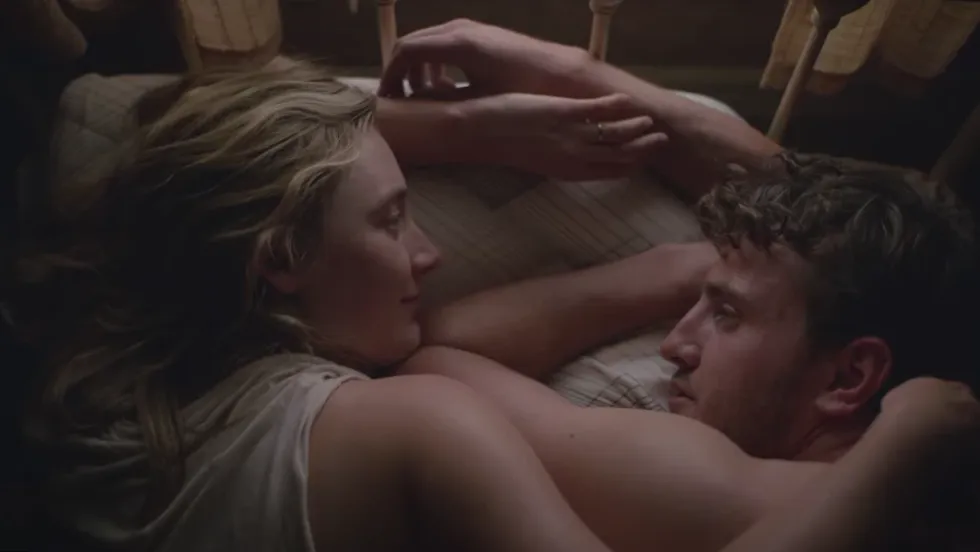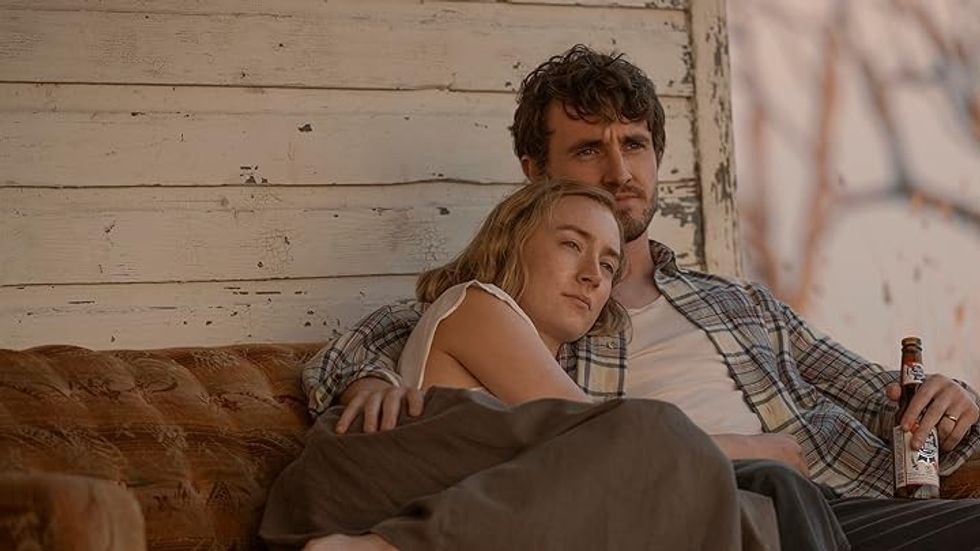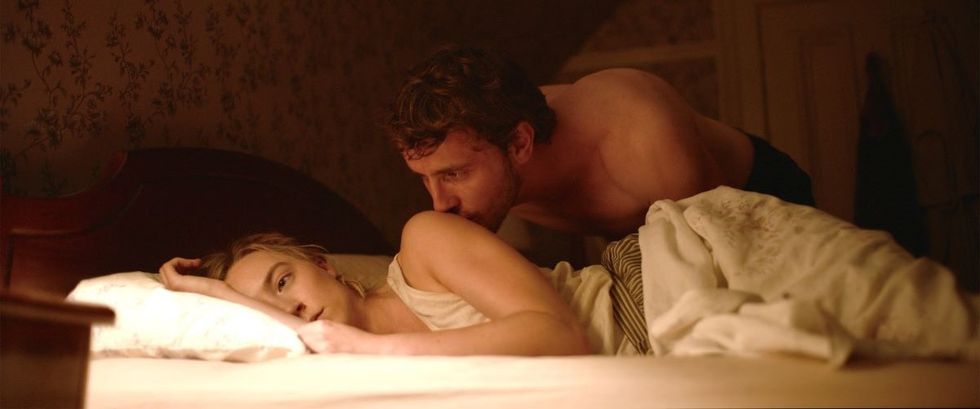'Foe' Director Garth Davis on Novel Adaptation, Production Challenges, and Sci-Fi Advice
Foe director Garth Davis talks with No Film School about his latest science fiction psychological thriller.

'Foe'
Garth Davis quickly became a celebrated director with a vision. After his six time Academy Award nominated feature debute, Lion, and his highly acclaimed biblical drama, Mary Magdalene, Davis returns with a science ficiton pyschological thriller, Foe.
Editor's Note: This interview has been edited for length and clarity.
NFS: What was it that drew you to the story? What was it about Iain Reid's original novel and original screenplay that drew you to both co-write it and direct the film?
Garth Davis: It was a lot of things. The mystery really drew me in. I loved that. I had no idea where the novel was going when I was reading it, and I was excited about the mystery of it. I loved the peppering of this view into the near future. I found that exciting, but the thing that captured me was this portrait of a decaying marriage and then, within that, this woman, Hen, really trying to save that and also explore her own destiny and agency. I loved that she was this great empath. She understood our connection to nature and our responsibility to the planet. I fell in love with her, and what she was fighting for is what I fight for in my own life, so was in.
It was deep. It was exciting and entertaining, but it had a real message that I felt was meaningful especially where we are right now in the world. I just feel like we're all asleep at the wheel. It's all about distraction and satisfaction and gratification, but are we actually in real relationships with ourselves? Are we actually in real relationships with our partners, and are we in a relationship with the earth? They're the questions it's raising.
NFS: This film wrestles with so many themes of relationships starting with your partner, with strangers, with the idea of partners, even yourself. How do you balance these tones as the story unfolds?
Davis: The beautiful thing about a film is that it will reveal questions you didn't even imagine were going to come up, so I guess beautiful, hopefully, art just gives you these kinds of endless questions and thoughts and ideas. I think the movie has all of that. Then, the AI comes up with this idea of being replaced or this idea of identity. Even Hen at the beginning of the film says it's like, "He's replaced me with someone else." The idea is that when you meet someone on a soulful level at the beginning of a relationship and, as it goes along over time, that person changes in your mind and maybe you become someone different from yourself to make them happy. That idea of identity and who you are is fascinating, and mirroring that up against the AI was just a wonderful metaphor. Those kernels, those core ideas were there, and I guess, as you're exploring that, it just opens up all these other questions, which is exciting.

'Foe'
Credit: Amazon Studio
NFS: Can you talk to me about what the casting process looked like? What was it like? Did you always have Paul Mescal and Saoirse Ronan in mind when you were co-writing the script?
Davis: We had a long casting process. I was pretty determined to cast Hen first because she's the kind of the spiritual heart of the story, and it was important to me that whoever played Hen had this inner light and just had this very believable connection with nature and with spirit, and that needed to be there and then, obviously, we can close that over with all of the problems and the stresses, but the central core of that actress needed to be light-filled, and that's who Saoirse Ronan is. I mean, she is, yes, the most extraordinary actress, but as a human being, as a spirit, she is truly beautiful and shining, so it was a no-brainer that she was fantastic for the film. Once we cast her, I had to go and find her a husband. I didn't want it to feel like a Hollywood stunt casting. Even though Paul is now a huge megastar, I just wanted to find something that felt believable.
When I met Paul, he was just actually so down to earth and so extraordinarily passionate about relationships, this story, sentience, and everything it meant. It just felt so great, and then the icing on the cake is they're both from Ireland, so, yeah, that shared heritage was really fantastic because our characters in the movie were married straight out of school, and lived in one area their whole lives. Something just felt so perfectly right for these two, and I couldn't believe they'd never been in a film before. That's amazing.
NFS: When you're working with these actors on set and you're fighting those emotional beats for each scene, is that something you already knew going into production or is that something that you let your cast explore and find on their own?
Davis: You definitely go into the scenes with a shared understanding of what it means or where your character is at. You work individually with the actors because it's their own truth. You don't have to worry about the other character's truth. I would sit down and go through the entire script with Saoirse. I'd go through the whole script with Paul and Aaron and just really drill down and debate and explore and process, "What is this scene doing here, and where is that in your arc?" You don't have to have the final result, but you have to have some really good ideas, some really good things, and then, once you have that, you can witness how to explore that.
I see a scene as witnessing the actors exploring those themes with words in their mouths, with stakes placed on them, and then I can manipulate how something is staged or, when a character enters, are they looking at each other, not looking at each other? You can play around with that to see how that interrupts or excites those choices that they're bringing to the room.
NFS: Each take is a little bit different, and I love that.
Davis: Absolutely. When I direct, it's almost like painting. I like to work fluidly and it's not mechanical, I guess. I like to just adjust subtly and keep things moving. I love that. Aaron [Pierre] works slightly differently from the other two actors. He has a very precise choice around how he wants to play the character which, in some ways, works so well with Terrance. Terrance just has this very precise way which I found really refreshing because I'm not used to that. He did a lot of work to come up with some really amazing choices to find the truth and the real reasons why Terrance was doing what he was doing. He really believed that it was going to better humanity. I found that really, really great as well. Putting them all together in one scene, always just felt really dynamic.
'Foe'
Credit: Amazon Studio
NFS: This world that you've built, this very isolated world in this not-so-distant future, it feels very reminiscent of other films like Interstellar. What were the inspirations when you were building this world during the pre-production process?
Davis: I guess what was exciting to us was that the house in a way is very nostalgic because it's representative of Junior's generational legacy, which Hen is being contracted to be a part of in a way. You wanted to feel the trappings of all the women before her in that house. It's almost like a time machine, I guess, and that's what Junior is holding on to. It's all old and dying from the past, and having that up against a world 30 years, 40 years from now, was just a really exciting proposition. This idea of what we hold on to and what we let go of was very interesting.
We wanted it to feel imminent. We wanted it to feel the science fiction elements, that glimpse into the near future to feel really plausible. We didn't overdo it. We didn't come up with something too extravagant. We put the same discipline and effort into it. The chicken towers, for example, are completely believable. We could even build that today if we wanted to, but it's just haunting to see the iconic nature of that. I mean, we're trying very hard to live on Mars. We have the International Space Station. All of those elements are based on just an extension of where we are now. I think all of that just in a way brings the central relationship story and the stakes and the questions that are raised. It just makes it feel more imminent for the audience. It makes you hopefully reflect on where you're at right now not, "I'll worry about that another time."
NFS: Every production has its challenges, but I'm curious about one challenge that you faced that made you learn something about yourself as a director.
Davis: That's a big question. You're always learning from your mistakes. Everything I do, every mistake that I come across in my previous work, I go, "I'm never going to do that again." I guess just a simple way to answer this is your instinct is never wrong. It really isn't. When you go against your instinct, all the problems start coming.
Then, some physical challenges we had that were hard to overcome in this film was the location we shot on. We were having the once-in-a-hundred-year storm and there was a lot of rain, and it was just this whole... Weirdly, the themes of the movie were happening real to us. We were building this house. The whole set was built as a house in a remote location, and the water level was just coming up the road. It was like we were dealing with that. It was almost like life was becoming art, art was becoming life. It was all happening.

'Foe'
Credit: Amazon Studio
NFS: Do you have any advice for any emerging directors who want to play in the world of sci-fi?
Davis: From my point of view, sci-fi is a way to access the deeper dimensions of who we are, so try and attach it to human exploration. That's when I think space can work well or use space to open up something that's not open in storytelling. I encourage all the directors that I mentor to find their voice in their work. It's a harder road. It's easier to be like someone else and reference lots of other things, but, ultimately, if you can find your voice and get through your personality or what you want to say to the world, then what a great world we're going to be living in. We're going to have all these movies that are not the same. They're not homogenous. We're going to have all these wonderful, rich points of view. You don't have to agree with it, but I would rather have a world full of lots of points of view rather than this kind of fast food outlet.
NFS: Couldn't agree more with that.
Davis: We need to do it. The directors need to stay strong and not sell out and just put their voices forward.Foe is now playing in select theaters.

 "'Back Home"via Mercedes Arutro
"'Back Home"via Mercedes Arutro 'Back Home'via Mercedes Arutro
'Back Home'via Mercedes Arutro 









